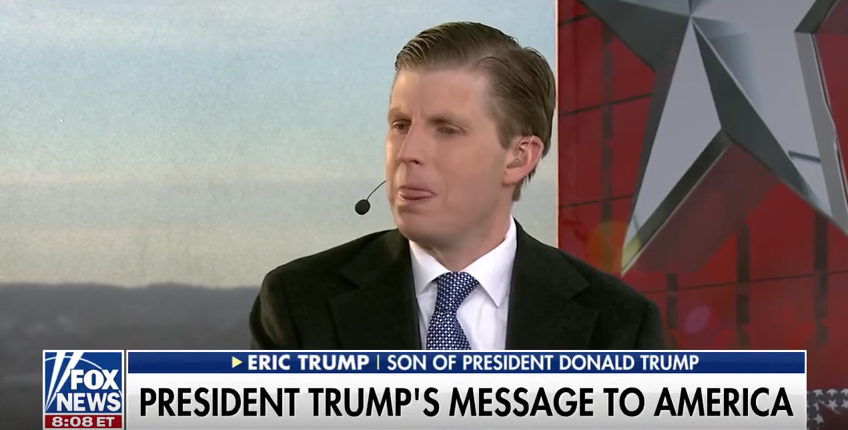The Freedom From Religion Foundation has written to Eric Trump to correct some of his misconceptions about the role of religion in the United States.
In a Jan. 31 appearance on “Fox & Friends,” Trump argued that “In God We Trust” is a principle that guides and unifies Americans:
I mean, they [congressional Democrats] didn’t stand for anything. When he said “In God We Trust” — when my father mentioned “In God We Trust,” the guiding principle of this country — no one stood. … I think it’s sad. There are things as Americans we should be united on and if we can’t be united on God …
Trump didn’t complete this thought, which is perhaps just as well. Americans are not now, nor have we even been, “united on God.” Religion is divisive. It may unite believers of the same stripe, but it deliberately excludes all others — and often calls for worse. An early Wisconsin Supreme Court justice put it eloquently: “There is no such source and cause of strife, quarrel, fights, malignant opposition, persecution, and war, and all evil in the state, as religion. Let it once enter our civil affairs, our government would soon be destroyed.”
When “under God” was added to our Pledge of Allegiance in 1954, religion literally divided “one nation, indivisible.” The idea that we “trust” in a god is not a founding principle, rather, like “under God,” it is an unfortunate recent addition to the national vernacular. It was affixed to coins in 1863 and paper currency in 1956, both times of national peril when people were more concerned with the country tearing itself apart and less focused on a few zealots putting their god on our money.
The U.S. Constitution is far more instructive than the trite motto Eric Trump and his father revere. Our godless Constitution only mentions religion three times — all exclusionary. In other words, the Constitution keeps gods out of the business of government and government out of the business of worshipping gods.
“The founders chose to keep state and church separate precisely because religion is divisive and they were seeking to build a pluralistic nation,” FFRF Director of Strategic Response Andrew Seidel writes to Trump. “They didn’t build that nation or secure our freedom with theology or cheap religious slogans, but with a document that puts all power in us, in We the People. Anything less would have been un-American.”
And it worked. America is becoming more religiously diverse with each passing year. Currently, nearly one-quarter of Americans are religiously unaffiliated and nearly 30 percent are non-Christians, either practicing a minority religion or no religion at all. Younger Americans are even more estranged from religion. A recent survey found that 21 percent of Americans born after 1999 are atheist or agnostic. These Americans are not “united by God.” Quite the opposite.
Trump père et fils would do well, FFRF advises, to remember the words of James Madison, the Father of our Constitution: “Religion and government will both exist in greater purity, the less they are mixed together.”
If Trump Sr. wants to unite this nation, he should work on being a president to all Americans, including atheists, agnostics and the nonreligious — nonbelievers and non-Christians of every stripe and of every color. Then only will “We the People” acquire real meaning.
The Freedom From Religion Foundation is a national nonprofit with more than 32,000 members across the country. It protects the constitutional principle of separation between state and church, and educates the public on matters relating to nontheism.

